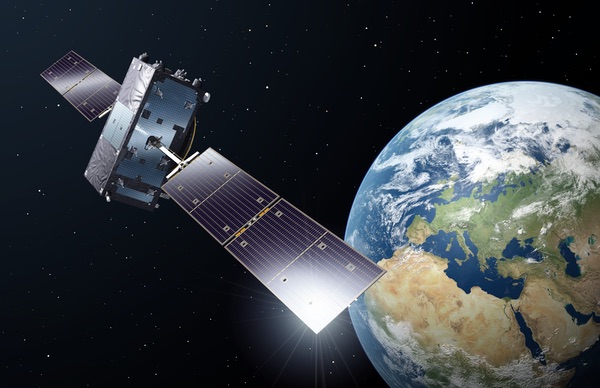Global navigation satellite systems: a Symbiotic Realist paradigmby Nayef Al-Rodhan
|
| One view is that global users will be able to obtain more precise and reliable services when the world’s major navigation systems become compatible. The question is, what does “compatible” look like? |
Although competition in the space domain is healthy and necessary for our evolution, improvement, and innovation, the increasingly complex capabilities of space technologies have also brought the element of defense further up on the agenda. A global race has begun to construct an ever more accurate satellite infrastructure. With these developments comes the rise of increasingly hostile cyber operations, such as the transmission of counterfeit signals, otherwise known as spoofing, or the intentional interference with signals, known as jamming—both a growing concern to global security (see “Cyber security and space security”, The Space Review, May 26, 2020).
The EU’s Galileo project boasts a Public Regulated Service (PRS) to be used by government agencies, armed forces, and emergency services. It will use an encrypted navigation service for governmental authorized users and sensitive applications, requiring high continuity and making the system more resistant to jamming and spoofing.
Unsurprisingly, the more advanced hostile cyber operations become, the higher the security threat to space assets. The danger of these threats is that they have the potential to cause damage to military operations, critical national infrastructure, and key economic sectors, as well as being used against primary targets in future warfare.
Separately, the US has been vocal about China’s burgeoning satellite navigation network, the Beidou system, arguing that it could pose a threat to US security if it enhances China’s own military capabilities with a system rivalling the American Global Positioning System (GPS).
Dr. Larry Wortzel of the US-China Economic and Security Review Commission has expressed his concern at Beidou’s two-way communication system that allows it to identify the locations of receivers, meaning that all cellular devices could potentially be tracked through continual communication with towers or satellites. Despite this, there is no doubt that Beidou is the standout choice over the popular GPS for countries in the Asia-Pacific region, which has a projected market revenue of €96.8 billion for 2025. Another very sophisticated navigation system is the Russian GLONASS system which continues to develop exceptional capabilities.
The EU maintains that there is an increasing need for all systems to remain fully compatible and interoperable, but with competition fierce between key space faring actors, does this leave adequate room for cooperation? The optimistic view, as espoused by Wang Li, an expert on China’s Beidou system, is that global users will be able to obtain more precise and reliable services when the world’s major navigation systems become compatible. The question is, what does “compatible” look like?
| Given humanity’s increasing and irreversible dependence on outer space for daily critical needs, any insecurity or conflict in space, even if unintentional, will compromise space and terrestrial security for everyone. |
As global navigation satellite system (GNSS) messages, signal structures, carrier frequencies, codes, and modulations directly affect interoperability, cooperation at the international level should be conducted from an early stage of development. On a multilateral level, the International Committee on Global Navigation Satellite Systems (ICG) should continue to encourage compatibility and interoperability among global and regional systems, leaving the Asia-Pacific Economic Cooperation (APEC) and GNSS Implementation Team (GIT) to focus on air traffic control and aviation issues.
However, as Paul B. Larsen, an expert in space law, highlights, there is little international law specifically regulating GNSS, and there has been a glaring lack of development of an international legal structure to accommodate its rapid growth. He suggests that the soft law governance of the Internet could be a relevant framework to consider. What is clear is that some degree of framework needs to be put in place, sooner rather than later.
Given humanity’s increasing and irreversible dependence on outer space for daily critical needs, any insecurity or conflict in space, even if unintentional, will compromise space and terrestrial security for everyone. This means that zero-sum paradigms do not work in outer space and should be replaced by what I have called the “Multi-sum security principle”, as space will either be safe for everyone or for no one.
The way out is for spacefaring nations to sign up to a combination of normative frameworks that cover GNSS as well as any other space activity. This should allow for non-conflictual competition and absolute gains; such a framework, which I have developed and called “Symbiotic Realism” guarantees that.
Note: we are using a new commenting system, which may require you to create a new account.
